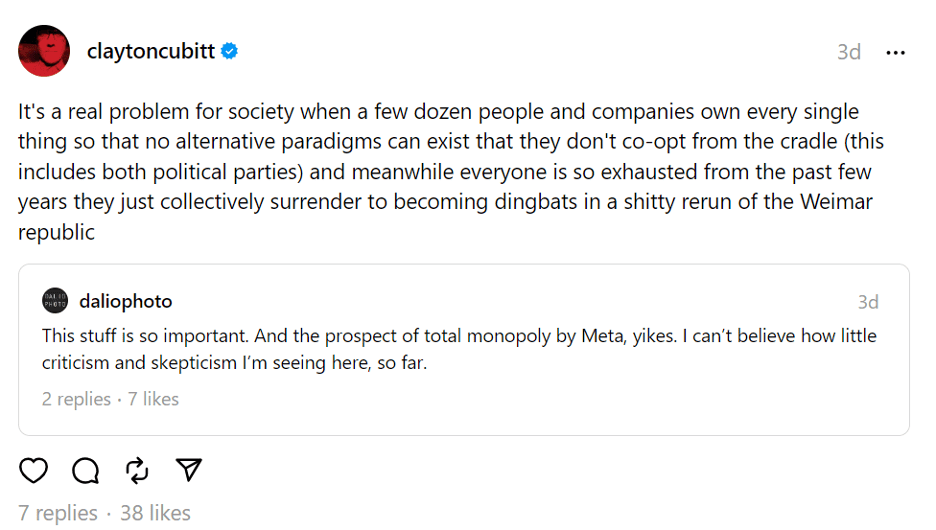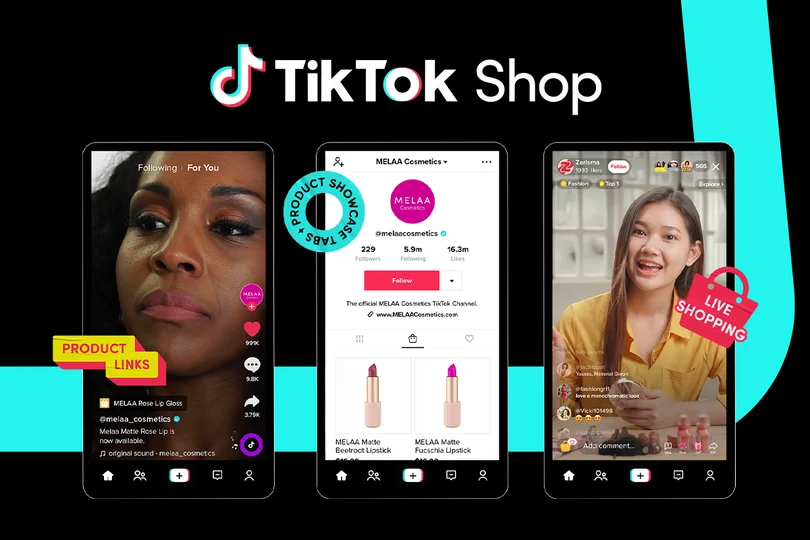On July 5, 2023, Mark Zuckerberg, founder and CEO of Meta – the parent company of Facebook, Instagram, and WhatsApp, announced the initial version of the new platform, Threads.[1]
Designed to “share with text,” Threads is a Twitter rival to satisfy users fleeing the chaos of Twitter under Elon Musk’s command. In just two days after launch, Threads surpassed 70 million sign-ups. In response, Twitter is threatening legal action.[2]
 Source: Threads
Source: Threads
While this is a good sign for Meta, it calls into question the company’s move toward market control by copying and destroying rival platforms.
Monopolies are never a good sign for the market. With no competition, companies have no check on power to do as they please, and consumers have no choice or alternative. Monopolies also cause innovation to stagnate – and for the many things Zuckerberg has been, uninventive has not been one of them.
Twitter is one of the social media giants, but it’s never been a comparable rival to Meta’s platforms. Despite that, it has been a profound influence in the world of media, politics, and tech, which has faltered under Musk’s leadership.
With a market gap, Zuckerberg and Meta had an opportunity to swoop in, making Meta even larger and more dominant.
Threads vs. Twitter
Threads’ quick adoption reveals two things: users were quick to abandon Twitter among growing issues with Musk’s leadership and Instagram is a major power player in the social media sphere.
With over two billion users – exceeding Twitter’s 238 million users upon Musk’s takeover – Instagram was a brilliant launchpad for Threads. Users signed up through their Instagram account and migrated all their data over in a single tap.
The app was also promoted via Instagram and created a seamless onboarding process that solved the “cold start” problem, which usually requires new platforms to take time to grow. Instead, users just recreated their experience on another app, causing it to boom almost overnight.
The Meta Monopoly
Rival platforms have always had a lot to overcome to enter the market, including the major long-standing platforms like Facebook, Twitter, and Instagram. TikTok managed to do it with innovation and a keen sense of the target audience, but other platforms have not been as lucky.
From a competition perspective, Meta’s dominance allows it to raise the already-high barriers to entry. New platforms may not have the existing user base or resources to accomplish what Meta did with Threads, leaving them at a significant disadvantage at launch.
 Source: Threads
Source: Threads
This risk is highlighted by the European Union’s (EU) new antitrust laws that go into effect in the coming months to protect competition.
Under the EU’s Digital Markets Act, so-called “digital gatekeepers” like Meta and its subsidiaries will not be permitted to combine user’s data from multiple platforms or require them to sign up for one platform in order to use another – the key issue with Instagram and Threads.[3]
As of right now, Threads won’t launch in Europe until it can comply with these laws, which brings the competition issue into sharp relief. It also brings the issues of copying and destroying rival platforms into the forefront.
Meta’s growing dominance isn’t just in the media sphere, either. Threads offers a wealth of data that Meta can use to train its developing AI technology, giving it leverage to compete with Google and OpenAI.
What About Brands and Users?
There’s no question that Threads represents a threat to Twitter. In terms of competition, Threads is forcing Twitter to revamp its service, which is a good thing. But the concentration of power means the giants will only grow larger, leaving smaller platforms and potentially innovative newcomers dead in the water.
For users, that means fewer app opportunities and less consumer control. For brands and influencers, that presents a serious issue in the advertising market.
Zuckerberg claims that Threads won’t have advertising capabilities until it scales significantly, but given the rapid adoption, that may not be far off. Either way, Threads is only reinforcing Meta’s considerable hold on the advertising market.
If Threads takes out Twitter completely, there’s nothing to prevent the advertising costs from skyrocketing – especially with the importance of social media and influencer marketing for brands.
Alleviating Competition Concerns
There is one promising update for Threads and the future of market competition. According to Instagram’s head Adam Mosseri, the company intends to integrate with the same open protocols used by distributed social media platforms like Mastodon.
If this happens, users will have the ability to migrate accounts and data seamlessly – just like launching Threads from Instagram – to a rival platform that isn’t under the purview of Meta. True competition can reign as users choose the platform that gives them value and quality, rather than lack of choice.
While this could be lip service amid growing criticism over monopolies and market control, it shows hope for a future with a broad, decentralized social networking infrastructure that isn’t under the control of one giant – or two crazed billionaires vying for power.
Sources:
[1] https://about.fb.com/news/2023/07/introducing-threads-new-app-text-sharing/



